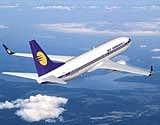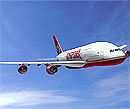

The decision not to fly on August 18 was taken at a meeting of private carriers under the banner of the Federation of Indian Airlines (FIA), which was attended by Kingfisher Airlines’ Vijay Mallya, Jet Airways’ Naresh Goel and others, here on Friday. The decision will affect thousands of fliers. In Delhi, the government reacted sharply, opposing the strike and asserting that the state-run Air India would not only fly that day but also operate additional services to reduce inconvenience to fliers.
The Civil Aviation Ministry, which is learnt to be of the opinion that the private airlines may not really carry out the threat, maintained that it was doing all it could to reduce the problems the sector is facing.
It added: “The government understands the difficulties being faced by the aviation sector. However, the government does not support any move that will inconvenience the travelling public of the country. We advise the airlines to engage in a dialogue with the government.” It is for the first time that the airlines owners have decided to go on strike for their demands. The decision will not affect international flights of the carriers, which have been kept out of the loop.
It is a “well-considered decision of all members” not to fly on August 18, to protest against high aviation turbine fuel (ATF) and airport charges, FIA secretary-general Anil Baijal told reporters after the meeting.
While the meeting was on, the government struck back by further increasing the prices of ATF by Rs 620 per kilo litre effective Friday midnight.
Baijal, who is a former civil aviation secretary, said the carriers were suffering because of falling traffic, high prices of ATF and the recent increase in airport charges. As such, no private airline will operate on August 18 and Mallya said refunds would be given to passengers who have had tickets booked for that day. The private airlines are currently facing huge losses as a result of fall in the number of passengers, high ATF prices and taxes and recession. Coupled with these, there is overcapacity and shortage of skills.
Huge loss
According to FIA, the private airlines have lost Rs 10,000 crore in fiscal 2008-09 and the losses could rise to as much as Rs 57,000 crore in the current fiscal.
Mallya was forthright stating that if the government did not pay heed to the private carriers’ just and rightful demands, they will suspend operations indefinitely.
Mallya knows the core of the problem as his Kingfisher Airlines has already warned its 6,000 employees of likely delay in payment of salaries due to a liquidity crunch.
“Just because some of us reduced our losses during a particular quarter or some of us made a little profit in a particular quarter, doesn’t mean it is sustainable. At the end of the day, we are in a business, which is becoming increasingly unviable only because we are taxed to death, and the government needs to listen to our pleas. That is it, simple,” Mallya said.
Jet Airways’ Naresh Goel refused to call it an “ultimatum” but said it was the only way to draw the government’s attention to the plight of the aviation industry. “The operations are not sustainable any more and we have been asking for government help for a long time now,” he added.
Industry observers said despite their efficient management and lower ratio of employees per aircraft, the private carriers were faced with enormous cost pressures and low traffic due to a general global recessionary trend.
The FIA said the ATF taxes were unsustainable and the estimated airline levies stood at $250 million. It said the charges for airport services were set arbitrarily by providers and the depreciation of the rupee has hurt the aviation industry. Air India, itself under mounting government pressure to restructure due to huge losses, will not join the strike. The company will operate additional flights on August 18.
Its stand notwithstanding, the company was mulling cancelling delivery of six Boeing 777 long-haul aircraft after the board recommended the step. Air India Chairman and Managing Director Arvind Jadhav and Boeing India president Dinesh Keskar held a meeting in Mumbai on Friday at the Air India office to discuss the matter.
“Air India is in dialogue with Boeing for cancellation of six B-777 aircraft deliveries in 2010-11 and 2011-12 in view of the current global aviation scenario,” an Air India spokesperson said.
The national carrier, which is estimated to suffer a loss of Rs 7,200 crore in 2008-09, had ordered 111 aircraft, including 68 from Boeing, at a total cost of over Rs 50,000 crore to augment its fleet. The fleet renewal plan is currently being reviewed by the carrier.
However, on the reasons stated by the private airlines for their decision to strike, Patel said the issue of tax on ATF (aviation turbine fuel) was a matter for the states and the ministry has been requesting the states for the last few years to see reason.
“The other issues primarily relate to the slowdown in the economy, global and domestic, and the impact of high prices of ATF in 2008-09,” he added.
Finance minister Pranab Mukherjee said he would talk to Patel over the issue.
DH News Service